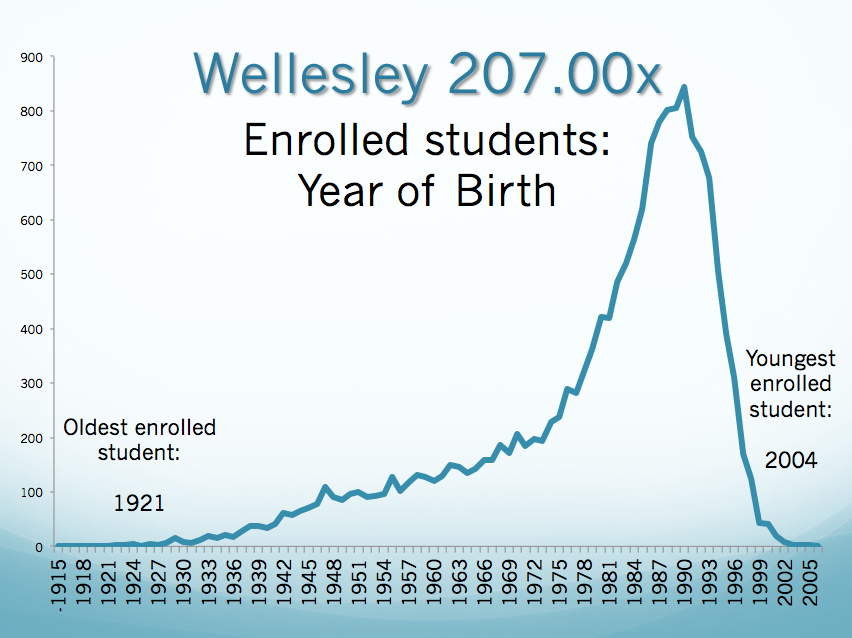I will be doing a series of quick snapshots of my MOOC, 207x (Introduction to Human Evolution), throughout the semester. I wanted to begin with one showing the self-reported year of birth of the enrolled students. This is actually missing ~3000 late registrants or people who left this question blank, but a pretty fascinating snapshot nevertheless.
As a fun curiosity point, the average age of the students in my class is…my age. Birth year 1979.


you are working toward big data, that’s interesting.
“I will be doing a series of quick snapshots of my MOOC, 207x (Introduction to Human Evolution), throughout the semester. I wanted to begin with one showing the self-reported age at birth of the enrolled students.”
Wow. I’m really surprised to see so much variation. My age at birth was zero and so was that of everyone I know.
Pivoting to mocking myself: now I really feel old.
My born date – December 03 1944
But in a tribe in Africa, this borne day is when the mother “thinked” to have a baby.
Read follows in spanish or translate to english:
source: http://www.youtube.com/watch?v=RTElWVGGsNw
Existe una tribu en África, donde la fecha de nacimiento de un niño no se toma como el día en que nació, ni como el momento en que fue concebido sino como el día en que ese niño fue “pensado” por su madre.
Cuando una mujer decide tener un hijo, se sienta sola bajo un árbol y se concentra hasta escuchar la canción del niño que quiere nacer.
Luego de escucharla, regresa con el hombre que será el padre de su hijo y se la enseña. Entonces, cuando hacen el amor con la intención de concebirlo, en algún momento cantan su canción, como una forma de invitarlo a venir.
Cuando la madre está embarazada, enseña la canción del niño a la gente del lugar, para que cuando nazca, las ancianas y quienes estén a su lado, le canten para darle la bienvenida.
A medida que el niño va creciendo, cuando el niño se lastima o cae o cuando hace algo bueno, como forma de honrarlo, la gente de la tribu canta su canción.
Hay otra ocasión en la que la gente de la tribu le canta al niño.
Si en algún momento de su vida, esa persona comete un crimen o un acto socialmente aberrante, se lo llama al centro de la villa y la gente de la comunidad lo rodea. Entonces, le cantan su canción.
La tribu reconoce que la forma de corregir un comportamiento antisocial no es el castigo, sino el amor y la recuperación de la identidad. Cuando uno reconoce su propia canción, no desea ni necesita hacer nada que dañe a otros.
Y así continua durante toda su vida.
Cuando contraen matrimonio, se cantan las canciones juntas.
Y finalmente, cuando esta persona va a morir, todos en la villa cantan su canción, por última vez, para él.
. . . . .
Puedes no haber nacido en una tribu africana que te cante tu canción en cada una de las transiciones de tu vida, pero la vida siempre te recuerda cuando estás vibrando a tu propia frecuencia, y cuando no lo estás.
Sólo sigue cantando y encontrarás tu camino a casa
Year of birth: 1996
Yeah rock on the 70’s, 1978 that is
I was born in 1988..
February 1969
Quite interesting. I was born in ’88, as were most other students it seems! Thanks for sharing.
Would be even more interesting to run the comparison across different EdX courses. I bet you’ll see some differences.
Very interesting age variation that exists in its course, in the case of human evolution has been a great period of experiences that can be reported.
Birthdate 1939
BirthYear – 1946
Birth year 1977. The same year as the original Star Wars!
I like to think that those of us on the (far) left tail of the curve aren’t old, just more evolved since birth.
Oh no…but you are not more “evolved”, you are more “developed!” Individuals don’t “evolve” throughout our lives, we develop. Populations evolve over time. So if anything, you might properly be described as more developed and less evolved (though insignificantly so in the latter case).
September 1980